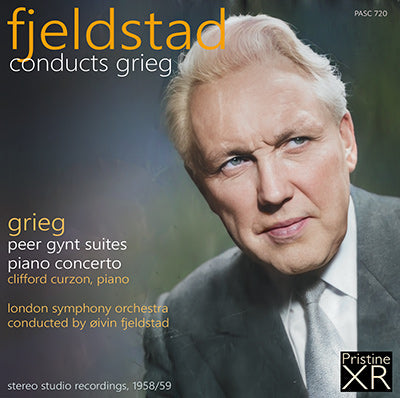
- Producer's Note
- Full Track Listing
- Cover Art
“…Mr. Fjeldstad and Decca go two better on that count. They include the prelude to the play which begins with the Peer theme (already known from Ingrid’s Abduction in the second suite), goes on to Solveig’s Song, and interrupts that with some viola solos which I thought a remarkable portrayal of Peer’s character, but turn out just to be Norwegian dance music — suggesting that Peer is a typical Norwegian which was, I believe, Ibsen’s intention. At the end of the second suite Mr. Fjeldstad adds the Dance of the Mountain King’s Daughter, which is short and pleasant.
What good music it is! Most of us have lived all our lives with the first suite, but as one plays this record it bobs up again as fresh as a daisy. This is particularly true of the stereo disc in which I enjoyed, not so much the spread and spaciousness of the sound, as the pungency and impact of the colours. Even the Hall of the Mountain King, which I feared I had had for good, after an excessive addiction to it when I was a boy, came up with real excitement.
Mr. Fjeldstad conducted the Decca Götterdämmerung rather poorly I still feel. This Grieg record shows him in a most laudable light; the performances are neat and stylish and also full of character.”
W.S.M., The Gramophone, November 1958
“I was hauled over the coals by several people for revolting against György Cziffra’s beady-eyed rediscovery of Grieg’s piano concerto. It was the heavily fragrant stereo that disturbed me more than its more sober mono original, but after hearing both several times, and now the stereo version again, I remain sure that it’s a wrongheaded performance, because it seeks to drag into the work what isn’t fundamentally there. I conceive Grieg’s concerto as something more lyrical and deep-searching than a frisky warhorse. One can regard it indeed as orchestral chamber music, so often is the soloist playing with or under other members of the orchestra — and Grieg himself wrote of creating happy homes where other composers erected temples on the heights. But there is a big view to be taken of this concerto, so long as the scale is right. I have heard Cherkassky play it big. with such love that he convinced me against my will; I have heard Arrau and also Robert Riefling play big in the climaxes and intimate in the lyrical music, and unify both aspects. Clifford Curzon does the same, and his is a supremely successful version of the concerto because everything that he does Is perfectly natural, and perfectly musicianly. He imports nothing from outside, but shows the meaning and glory of what Grieg actually created. Comparing these two performances, you can say that both are examples of masterly pianism, Curzon’s not less than that of the deservedly admired Cziffra; but where Cziffra orders us to admire his loot, Curzon discreetly pulls hidden treasure out of his pocket. And there’s the difference.
Curzon isn’t too proud to serve as the orchestra’s accompanist; he doesn’t seek to steal the flute’s limelight in the middle section of the first movement. His thesis all the time consists of the rhythmic life of the music, and its harmonic train of thought, the means whereby a movement gets from A to Z. “In the beginning”, said (I think) Bülow, “was rhythm”. Curzon’s playing on this disc proves the proposition; every great performer does. In Grieg’s concerto he has the benefit of a Norwegian conductor who knows instinctively about the lilt in Grieg’s music, and who dwells just enough on each important moment. Together with the L.S.O., they make this concerto fresh again without ever striving after effect. There is nothing tarty about the stereo sound; it is just clear and vivid and beautiful — and the piano tone is even more lively than that of Cziffra’s disc.”
W.S.M., The Gramophone, February 1960
FJELDSTAD conducts Grieg
GRIEG Peer Gynt - Excerpts, Suites Nos. 1 & 2 (Opp. 46 & 55)
1. Prelude (No.1) (5:16)
2. Suite No. 1 - Morning Mood (No.13) (4:39)
3. Suite No. 1 - The Death of Åse (No.12) (4:35)
4. Suite No. 1 - Anitra's Dance (No.16) (3:34)
5. Suite No. 1 - In the Hall of the Mountain King (No.7) (2:47)
6. Suite No. 2 - Ingrid's Abduction and Lament (No.4) (3:55)
7. Suite No. 2 - Arabian Dance (No.15) (4:46)
8. Suite No. 2 - Peer Gynt's Homecoming (No.19) (2:41)
9. Suite No. 2 - Solvejg's Song (No.11) (5:55)
10. Dance of the Mountain King's Daughter (No.8) (2:04)
Recorded 17-19 February 1958, Kingsway Hall, London
GRIEG Piano Concerto in A minor, Op. 16
11. 1st mvt. - Allegro molto moderato (12:43)
12. 2nd mvt. - Adagio (6:04)
13. 3rd mvt. - Allegro moderato molto e marcato (10:27)
Recorded 22-23 June 1959, Kingsway Hall, London
Clifford Curzon, piano
London Symphony Orchestra
conducted by Øivin Fjeldstad
XR remastered in stereo by
Cover artwork based on a photograph of Øivin Fjeldstad
Total duration: 69:25

